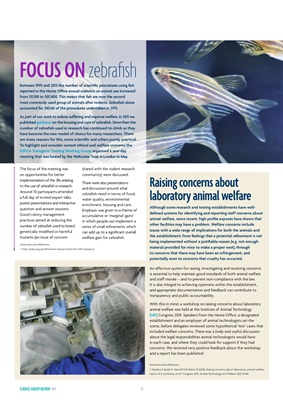
SCIENCE GROUP REVIEW 2014 20
The focus of the meeting was
on opportunities for better
implementation of the 3Rs relating
to the use of zebrafish in research.
Around 70 participants attended
a full day of invited expert talks,
poster presentations and interactive
question and answer sessions.
Good colony management
practices aimed at reducing the
number of zebrafish used to breed
genetically modified or harmful
mutants (an issue of concern
shared with the rodent research
community) were discussed.
There were also presentations
and discussion around what
zebrafish need in terms of food,
water quality, environmental
enrichment, housing and care.
Emphasis was given to a theme of
accumulative or 'marginal' gains1
in which people can implement a
series of small refinements which
can add up to a significant overall
welfare gain for zebrafish.
FOCUS ON zebrafish
Between 1995 and 2013 the number of scientific procedures using fish
reported in the Home Office annual statistics on animal use increased
from 131,100 to 507,400. This means that fish are now the second
most commonly used group of animals after rodents. Zebrafish alone
accounted for 330,161 of the procedures undertaken in 2013.
As part of our work to reduce suffering and improve welfare, in 2011 we
published guidance on the housing and care of zebrafish. Since then the
number of zebrafish used in research has continued to climb as they
have become the new model of choice for many researchers. There
are many reasons for this, some scientific and others purely practical.
To highlight and consider current ethical and welfare concerns the
RSPCA Transgenic Training Working Group organised a one-day
meeting that was hosted by the Wellcome Trust in London in May.
Footnotes and references:
1. Hawkins P, Ryder K, Mortell N & Patten D (2014). Raising concerns about laboratory animal welfare:
report of a workshop at IAT Congress 2014. Animal Technology and Welfare 13(2): 81-86.
Raising concerns about
laboratory animal welfare
Although some research and testing establishments have welldefined systems
for identifying and reporting staff concerns about
animal welfare, some recent, high profile exposés have shown that
other facilities may have a problem. Welfare concerns include
issues with a wide range of implications for both the animals and
the establishment; from feelings that a potential refinement is not
being implemented without a justifiable reason (e.g. not enough
material provided for mice to make a proper nest), through
to concerns that there may have been an infringement, and
potentially even to concerns that cruelty has occurred.
An effective system for raising, investigating and resolving concerns
is essential to help maintain good standards of both animal welfare
and staff morale - and to prevent non-compliance with the law.
It is also integral to achieving openness within the establishment,
and appropriate documentation and feedback can contribute to
transparency and public accountability.
With this in mind, a workshop on raising concerns about laboratory
animal welfare was held at the Institute of Animal Technology
(IAT) Congress 2014. Speakers from the Home Office, a designated
establishment and an employer of animal technologists set the
scene, before delegates reviewed some hypothetical 'test' cases that
included welfare concerns. There was a lively and useful discussion
about the legal responsibilities animal technologists would have
in each case, and where they could look for support if they had
concerns. We received very positive feedback about the workshop
and a report has been published1.
Footnotes and references:
1. http://pilas.org.uk/refinement-lessons-from-the-2012-olympics/